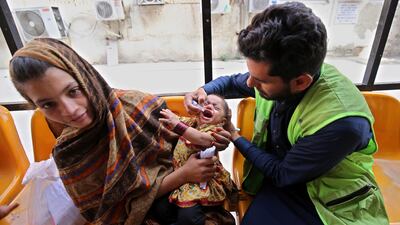If Pakistan’s polio vaccinators got together and formed their own city, it would be among the country’s 25 most populous. Armed with clipboards, ice packs and vials of vaccine, this 390,000-strong force of women and men routinely canvasses the country in an effort to reach uninoculated children at risk of contracting polio, an incurable disease eradicated from most of the planet but still endemic in Pakistan and Afghanistan.
The latest vaccination drive began on Monday. The challenge is immense – 43 million children in Pakistan are thought to remain unvaccinated.
And there has been a renewed sense of urgency this year. In January, Pakistani health authorities detected wild polio virus with genetic links to the variant circulating in Afghanistan. The same month, when the government launched a campaign, 62,000 parents – most of them in Sindh province – refused to vaccinate their children.
One of the greatest obstacles is a pervasive climate of scepticism and hesitancy around vaccines in Pakistan’s conservative tribal, rural and religious communities. At the root of the problem is a lack of health education and awareness. But misconceptions around religious beliefs – Islam is not opposed to vaccination – abound, and in the most isolated communities a general suspicion towards any perceived interference by the state into family life.
There have also been rare instances where vaccinations were used as an excuse to collect intelligence, which only contributed to the scepticism. In 2011, the CIA organised a fake vaccination programme in the town of Abbottabad, where Osama bin Laden was believed to be hiding, in its attempt to obtain DNA from the Al Qaeda leader's family.
Vaccine hesitancy is not rare, though the successes of recent inoculation drives – polio being among the most notable – has gone a long way to gaining public acceptance. The progress is perhaps unsurprising; the World Health Organisation and global charities have invested huge effort and resources into immunisation drives in poorer countries in recent decades. Donors have given millions of dollars to the cause, and the experience of Covid-19 has reignited public conversations in rich-world capitals about the importance of global vaccination. The UAE, in particular, has been a big supporter of polio vaccination in Pakistan, donating funds and helping train administrators for years. The UAE donated $23 million to the effort in 2021 alone and does so on a regular basis.
Today, polling shows growing acceptance in the developing world that vaccination is good for children’s health. In many poorer countries, access to vaccines is a far greater challenge than vaccine hesitancy.
But health officials know that scepticism of vaccines remains a fundamental challenge, and even if a minority of people refuse to take vaccines, in many countries that can mean millions of people susceptible to contagious viruses. To eradicate polio, for instance, a country needs to immunise more than 95 per cent of its population. But in Sindh, the refusal rate may be as high as 15 per cent.
Pakistani authorities have been mulling more creative ways to address this. Sindh’s provincial assembly is currently debating legislation that could see parents fined and even face a month in prison for refusing to vaccinate their children against a number of diseases, including polio, measles and pneumonia. It would be a controversial move, but the debate alone has provoked much-needed conversations about children’s health in rural communities.
It is important to remember that during the Covid-19 pandemic, much was made about the unequal distribution of vaccines between rich and poor countries, in addition to episodes of vaccine hesitancy in countries throughout the world. The pandemic petered out before the problem was ever really addressed in a comprehensive, permanent way. Even though the pandemic has receded from most people’s minds, that does not mean the mission of protecting humanity from viruses is gone, and Pakistan’s polio fight is a good reminder that the biggest battlefront still lies in the developing world.


